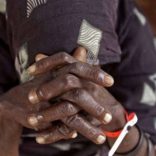Mozambique: Authorities confirm five deaths in Beira sinking - Watch
New Strategic Plan to Combat Corruption to introduce heavier punishments

The Central Anti-Corruption Office presented its strategic plan for the period 2018-2022 yesterday, envisaging increases in penalties for corruption.
The Strategic Plan of the Central Office for Combating Corruption (GCCC) for the 2018-2022 period provides, among other things, for improving the existing legal framework ability to penalise corruption and related crimes.
During the presentation of the plan, GCCC Director Ana Gemo said that the legislative revision should “support punishment with heavy fines and full restitution of values in crimes of embezzlement and graft as a supplementary measure to effective prison sentences”.
The law also provides for the preventive seizure of property in the cases of the aforementioned crimes and waives the possibility of suspending prison sentences.
Other measures mooted are the criminalisation sub-billing for goods and services by public servants and intentionally disregarding public tender rules with the objective of favouring an economic agent.
President Nyusi launches challenge

President Nyusi said that eliminating corruption was a matter of emergency because of its negative effect on the country’s development. Nyusi also challenged the Central Office to Combat Corruption to “ensure the accountability of transgressors, in particular state officials and agents, so as to safeguard national institutions’ credibility”.
In turn, EU Chargé D’affaires Sergius Varvaroussis stressed that only “strong decisions and radical changes” would render the fight against corruption effective. The fight against corruption “requires an integrated, efficient, predictable and accountable judiciary, but it also needs legislation that is appropriate to the national and international context”, he added.
Despite the Public Prosecutor’s Office achieving improvements year after year, the results were still not enough, he said.

European Union support
Varvaroussis took the opportunity to announce that the European Union would donate spend more than 750 million meticais, equivalent to about 10 million Euros, to fight corruption in the country over the next five years.
The amount should be fully employed in the justice, civil society and media sectors, according to the European Union’s chargé Gd’affaires.
“The program plans to intervene in schools by reinforcing the so-called anti-corruption groups that the Central Office for Combating Corruption is implementing with the Ministry of Education and will also facilitate the integration of civic education in anti-corruption in school curricula,” he explained. The implementation of this strategic plan would cost 545 million meticais, the equivalent to around seven million Euros.
Innovation in the Strategic Plan
One of the innovations of this GCCC Strategic Plan is the eventual creation of specialised units to try cases related to corruption, in order to speed up the handling of these cases.
DW Africa sought the opinion of the Bar Association’s Flávio Menete.

“Having people dedicated to dealing with corruption matters will be much better, because we will get tangible results on a regular basis and people will understand that getting involved in corruption does not pay off,” he said
Appeal from civil society organisations
In another development, four Mozambican civil society organisations have issued a communiqué in which they warn of the level of suffering people are experiencing as a result of the hidden debts, and call on international donors to resume aid to the country, even if outside the state budget.
The Mechanism of Support to Civil Society (MASC), the Institute for Social and Economic Studies (IESE), the Centre for Public Integrity (CIP) and the Rural Environment Observatory propose that donors’ money be channelled to key areas such as health, education, sanitation and water, while maintaining pressure to clarify issues surrounding the ‘hidden debts’.
The use of the funds would be subject to a manual of administrative and financial procedures, with the support programmes being run by civil society organisations themselves.
A source linked to the group of international partners said that this path was being investigated, but no decision had yet been taken.













Leave a Reply
Be the First to Comment!
You must be logged in to post a comment.
You must be logged in to post a comment.